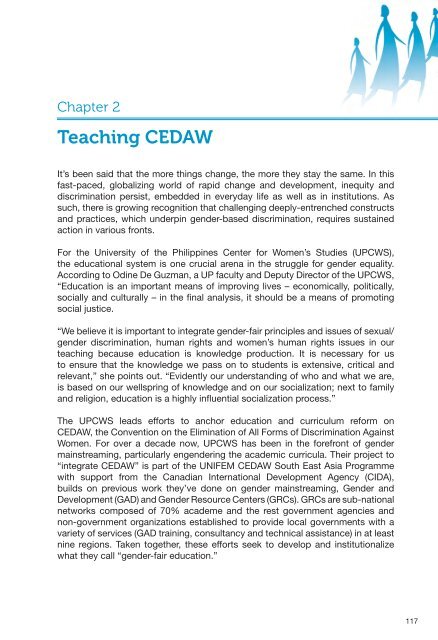Section 3 - Educating and Partnering for CEDAW
Section 3 - Educating and Partnering for CEDAW
Section 3 - Educating and Partnering for CEDAW
Create successful ePaper yourself
Turn your PDF publications into a flip-book with our unique Google optimized e-Paper software.
Chapter 2<br />
Teaching <strong>CEDAW</strong><br />
It’s been said that the more things change, the more they stay the same. In this<br />
fast-paced, globalizing world of rapid change <strong>and</strong> development, inequity <strong>and</strong><br />
discrimination persist, embedded in everyday life as well as in institutions. As<br />
such, there is growing recognition that challenging deeply-entrenched constructs<br />
<strong>and</strong> practices, which underpin gender-based discrimination, requires sustained<br />
action in various fronts.<br />
For the University of the Philippines Center <strong>for</strong> Women’s Studies (UPCWS),<br />
the educational system is one crucial arena in the struggle <strong>for</strong> gender equality.<br />
According to Odine De Guzman, a UP faculty <strong>and</strong> Deputy Director of the UPCWS,<br />
“Education is an important means of improving lives – economically, politically,<br />
socially <strong>and</strong> culturally – in the final analysis, it should be a means of promoting<br />
social justice.<br />
“We believe it is important to integrate gender-fair principles <strong>and</strong> issues of sexual/<br />
gender discrimination, human rights <strong>and</strong> women’s human rights issues in our<br />
teaching because education is knowledge production. It is necessary <strong>for</strong> us<br />
to ensure that the knowledge we pass on to students is extensive, critical <strong>and</strong><br />
relevant,” she points out. “Evidently our underst<strong>and</strong>ing of who <strong>and</strong> what we are,<br />
is based on our wellspring of knowledge <strong>and</strong> on our socialization; next to family<br />
<strong>and</strong> religion, education is a highly influential socialization process.”<br />
The UPCWS leads ef<strong>for</strong>ts to anchor education <strong>and</strong> curriculum re<strong>for</strong>m on<br />
<strong>CEDAW</strong>, the Convention on the Elimination of All Forms of Discrimination Against<br />
Women. For over a decade now, UPCWS has been in the <strong>for</strong>efront of gender<br />
mainstreaming, particularly engendering the academic curricula. Their project to<br />
“integrate <strong>CEDAW</strong>” is part of the UNIFEM <strong>CEDAW</strong> South East Asia Programme<br />
with support from the Canadian International Development Agency (CIDA),<br />
builds on previous work they’ve done on gender mainstreaming, Gender <strong>and</strong><br />
Development (GAD) <strong>and</strong> Gender Resource Centers (GRCs). GRCs are sub-national<br />
networks composed of 70% academe <strong>and</strong> the rest government agencies <strong>and</strong><br />
non-government organizations established to provide local governments with a<br />
variety of services (GAD training, consultancy <strong>and</strong> technical assistance) in at least<br />
nine regions. Taken together, these ef<strong>for</strong>ts seek to develop <strong>and</strong> institutionalize<br />
what they call “gender-fair education.”<br />
117

















